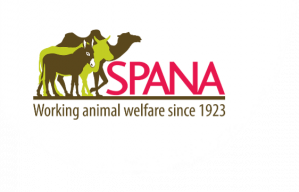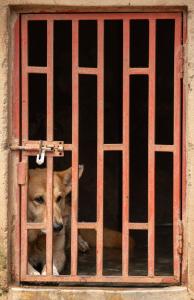Real-life Paw Patrol: SPANA project launched to save Malawi's forgotten working dogs
LONDON, UNITED KINGDOM, August 22, 2024 /EINPresswire.com/ -- As the world prepares to celebrate International Dog Day on 26th August, SPANA1 (the Society for the Protection of Animals Abroad) has launched a project to improve the overall welfare standards, health and working conditions of a group of dogs too often forgotten: the working dogs of Malawi.
With over two-thirds of Malawi’s population living in extreme poverty, crime rates are high, so working dogs are essential to the security and safety of homes, businesses and law enforcement efforts.
Breeds such as German Shepherds, Africanis, Boerboels, and Rottweilers protect properties and assist police in crime-fighting efforts, including narcotics and illegal wildlife detection. Yet, despite their crucial roles, the essential welfare needs of these animals are often overlooked.
“Malawi’s working dogs are a forgotten workforce,” said Linda Edwards, CEO of SPANA. “International Dog Day is a time when we celebrate the bond between humans and dogs, but it’s important to remember that not all dogs are companion animals. Many are essential workers who protect their communities but have slipped through the cracks of other animal welfare efforts. This project will ultimately support their welfare, highlight their vital work, and encourage companies to recognise the importance of good welfare standards.”
The project, delivered in partnership with the Lilongwe Society for the Protection and Care of Animals (LSPCA), is working closely with security companies, handlers and the owners of over 200 security dogs in Malawi to improve their understanding of animal welfare needs.
“Through no fault of their own, many people in Malawi are unaware of the basic needs of working dogs, such as constant access to clean, fresh water, nutritious food, and good shelters so that they can rest well and seek relief from the baking sun,” added Edwards.
“Dog food, which must be imported from neighbouring countries, is prohibitively expensive, often leading to severe nutrition deficiencies. Plus, there are prolonged periods without any enrichment or mental stimulation, critical for a security dog’s quality of life.”
SPANA and LSPCA are operating a stamp of approval system for security companies that meet strict animal welfare standards. This government-accredited stamp, issued by Malawi’s Department of Animal Health and Livestock Development (DAHLD), will serve as an annually renewable certification, encouraging companies to adhere to established animal welfare guidelines. It recognises companies that demonstrate good welfare standards, including adequate living conditions, shelter, nutrition, and veterinary care.
Additionally, SPANA and LSPCA are providing immediate veterinary care, including vaccinations, parasite treatments, health checks and nutritional advice.
“Many of these dogs have never had access to veterinary care. Veterinary supplies are scarce, so the threat of infectious, contagious diseases such as kennel cough, which causes great discomfort, and parvovirus, which can be fatal if untreated, also looms. These dogs are indispensable to their communities, and they deserve to be treated with dignity and care. This project is their lifeline,” Edwards added.
If the project is successful, SPANA plans to expand the initiative and continue helping working dogs in other regions with similarly critical needs.
As International Dog Day approaches, SPANA is calling on the global community to support this vital project.
Edwards concluded:
“International Dog Day is about celebrating all dogs, including the working dogs who labour to keep communities safe. We’re asking dog lovers around the world to stand with us in supporting these forgotten workers. With the help of our donors and partners, we can improve the lives of these incredibly hardworking dogs.”
SPANA’s work in Malawi is part of its larger mission to support working animals worldwide. In 2023 alone, SPANA provided veterinary care to over 336,000 working animals and administered over 529,000 treatments globally. By expanding its efforts in Malawi, the organisation hopes to improve the lives of working dogs and create a sustainable model of animal welfare that can be replicated in other regions.
For more information about SPANA’s work in Malawi and how you can help support this crucial project in honour of International Dog Day, please visit www.spana.org/dogs.
-ENDS-
Notes to editors:
• Interviews with Linda Edwards, CEO at SPANA, are available on request. Please register your interest with the media contact below.
• A selection of high-res images can be downloaded from here: https://drive.google.com/drive/folders/1732tKTvYlnYYlrkkB1rjWT_UnlT0imjR?usp=sharing
SPANA (the Society for the Protection of Animals Abroad):
SPANA has been the charity for the working animals of the world since 1923, transforming the lives of horses, donkeys, mules, and camels in need. The charity improves the welfare of working animals by ensuring the treatment and care of animals, training animal owners, and teaching children about animal welfare. Please see the charity’s website, www.spana.org, for more information.
The ‘Stamp of Approval’ programme enables a deeper look into the welfare issues of security dogs. The overall welfare of the dogs is noted through:
• Adequate nutrition resulting in good body condition scores and decreased susceptibility to infections.
• Good housing structures that provide adequate protection from the weather, sufficient ventilation, non-porous, cleanable surfaces, with bedding and sufficient space for the size/ number of dogs.
• Presence of enrichment (particularly important when dogs are kennelled for several hours a day).
• Suitable access to quality veterinary health care, including preventative health care like vaccinations, tick and flea control, and deworming, etc.
• Retirement of old dogs and resting sick dogs.
• Knowledge of how to take care of security dogs.
• Appropriate dog training, handling and transportation methods.
With over two-thirds of Malawi’s population living in extreme poverty, crime rates are high, so working dogs are essential to the security and safety of homes, businesses and law enforcement efforts.
Breeds such as German Shepherds, Africanis, Boerboels, and Rottweilers protect properties and assist police in crime-fighting efforts, including narcotics and illegal wildlife detection. Yet, despite their crucial roles, the essential welfare needs of these animals are often overlooked.
“Malawi’s working dogs are a forgotten workforce,” said Linda Edwards, CEO of SPANA. “International Dog Day is a time when we celebrate the bond between humans and dogs, but it’s important to remember that not all dogs are companion animals. Many are essential workers who protect their communities but have slipped through the cracks of other animal welfare efforts. This project will ultimately support their welfare, highlight their vital work, and encourage companies to recognise the importance of good welfare standards.”
The project, delivered in partnership with the Lilongwe Society for the Protection and Care of Animals (LSPCA), is working closely with security companies, handlers and the owners of over 200 security dogs in Malawi to improve their understanding of animal welfare needs.
“Through no fault of their own, many people in Malawi are unaware of the basic needs of working dogs, such as constant access to clean, fresh water, nutritious food, and good shelters so that they can rest well and seek relief from the baking sun,” added Edwards.
“Dog food, which must be imported from neighbouring countries, is prohibitively expensive, often leading to severe nutrition deficiencies. Plus, there are prolonged periods without any enrichment or mental stimulation, critical for a security dog’s quality of life.”
SPANA and LSPCA are operating a stamp of approval system for security companies that meet strict animal welfare standards. This government-accredited stamp, issued by Malawi’s Department of Animal Health and Livestock Development (DAHLD), will serve as an annually renewable certification, encouraging companies to adhere to established animal welfare guidelines. It recognises companies that demonstrate good welfare standards, including adequate living conditions, shelter, nutrition, and veterinary care.
Additionally, SPANA and LSPCA are providing immediate veterinary care, including vaccinations, parasite treatments, health checks and nutritional advice.
“Many of these dogs have never had access to veterinary care. Veterinary supplies are scarce, so the threat of infectious, contagious diseases such as kennel cough, which causes great discomfort, and parvovirus, which can be fatal if untreated, also looms. These dogs are indispensable to their communities, and they deserve to be treated with dignity and care. This project is their lifeline,” Edwards added.
If the project is successful, SPANA plans to expand the initiative and continue helping working dogs in other regions with similarly critical needs.
As International Dog Day approaches, SPANA is calling on the global community to support this vital project.
Edwards concluded:
“International Dog Day is about celebrating all dogs, including the working dogs who labour to keep communities safe. We’re asking dog lovers around the world to stand with us in supporting these forgotten workers. With the help of our donors and partners, we can improve the lives of these incredibly hardworking dogs.”
SPANA’s work in Malawi is part of its larger mission to support working animals worldwide. In 2023 alone, SPANA provided veterinary care to over 336,000 working animals and administered over 529,000 treatments globally. By expanding its efforts in Malawi, the organisation hopes to improve the lives of working dogs and create a sustainable model of animal welfare that can be replicated in other regions.
For more information about SPANA’s work in Malawi and how you can help support this crucial project in honour of International Dog Day, please visit www.spana.org/dogs.
-ENDS-
Notes to editors:
• Interviews with Linda Edwards, CEO at SPANA, are available on request. Please register your interest with the media contact below.
• A selection of high-res images can be downloaded from here: https://drive.google.com/drive/folders/1732tKTvYlnYYlrkkB1rjWT_UnlT0imjR?usp=sharing
SPANA (the Society for the Protection of Animals Abroad):
SPANA has been the charity for the working animals of the world since 1923, transforming the lives of horses, donkeys, mules, and camels in need. The charity improves the welfare of working animals by ensuring the treatment and care of animals, training animal owners, and teaching children about animal welfare. Please see the charity’s website, www.spana.org, for more information.
The ‘Stamp of Approval’ programme enables a deeper look into the welfare issues of security dogs. The overall welfare of the dogs is noted through:
• Adequate nutrition resulting in good body condition scores and decreased susceptibility to infections.
• Good housing structures that provide adequate protection from the weather, sufficient ventilation, non-porous, cleanable surfaces, with bedding and sufficient space for the size/ number of dogs.
• Presence of enrichment (particularly important when dogs are kennelled for several hours a day).
• Suitable access to quality veterinary health care, including preventative health care like vaccinations, tick and flea control, and deworming, etc.
• Retirement of old dogs and resting sick dogs.
• Knowledge of how to take care of security dogs.
• Appropriate dog training, handling and transportation methods.
Gemma Lewis
PMW Communications Ltd.
+44 7920 820018
gemma.lewis@pmwcom.co.uk
1 https://spana.org/




